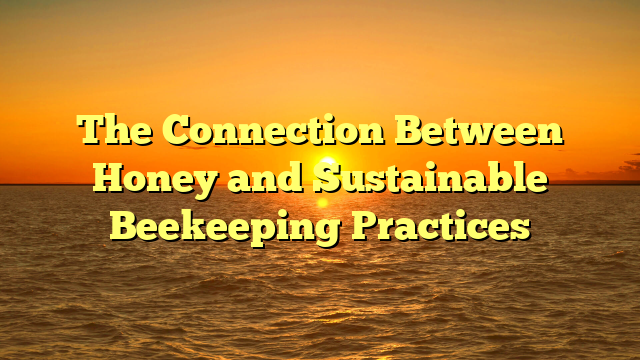
Honey, often referred to as “liquid gold,” is more than a natural sweetener; it is a product that reflects the health of the environment and the efforts of beekeepers. Sustainable beekeeping practices are essential to ensure the production of high-quality honey, protect bee populations, and support biodiversity. This article explores the connection between honey production and sustainable beekeeping, highlighting how responsible practices benefit both bees and the planet.
What Is Sustainable Beekeeping?
Sustainable beekeeping focuses on practices that prioritize the health and well-being of bee colonies, minimize environmental harm, and promote ecological balance. This approach emphasizes the long-term viability of beekeeping as an industry while safeguarding pollinators that play a critical role in global food production.
Key aspects of sustainable beekeeping include:
– Preserving Natural Habitats: Protecting and restoring wildflower-rich landscapes where bees can forage.
– Minimizing Chemical Use: Avoiding harmful pesticides and synthetic chemicals that can harm bees.
– Maintaining Healthy Hives: Ensuring that bees have access to diverse forage and managing diseases responsibly.
– Avoiding Overharvesting: Leaving sufficient honey for the bees to feed on, especially during winter months.
How Sustainable Practices Impact Honey Production
1. Higher-Quality Honey
Honey produced through sustainable beekeeping practices tends to be of higher quality. Beekeepers who prioritize colony health ensure that bees have access to diverse, pesticide-free forage. This results in honey with richer flavors, more nutrients, and fewer contaminants.
2. Ethical Harvesting
Overharvesting honey can leave bees without enough food to survive. Sustainable beekeepers practice ethical harvesting by leaving a portion of the honey for the bees, supplementing their diet with natural alternatives like pollen patties only when necessary.
3. Supporting pejuang138 produce better honey. Sustainable practices focus on minimizing stress for the bees, reducing exposure to diseases, and managing mites naturally rather than relying on chemical treatments.
The Role of Honey Consumers
Consumers play a vital role in supporting sustainable beekeeping by making informed choices:
– Choose Local Honey: Buying honey from local beekeepers supports small-scale, sustainable operations. It also reduces the carbon footprint associated with transporting honey over long distances.
– Look for Certifications: Labels like organic, fair trade, or “bee-friendly” indicate that the honey was produced using sustainable methods.
– Avoid Cheap, Adulterated Honey: Low-cost honey often comes from industrial operations that may exploit bees and contribute to environmental harm.
The Environmental Impact of Sustainable Beekeeping
1. Pollination Services
Bees are essential pollinators, responsible for the reproduction of many plants, including fruits, vegetables, and nuts. Sustainable beekeeping supports healthy bee populations, which in turn promotes agricultural productivity and biodiversity.
2. Preserving Ecosystems
Sustainable beekeeping encourages the conservation of natural habitats, fostering ecosystems that benefit not only bees but other pollinators, birds, and wildlife.
3. Reducing Pesticide Dependency
By advocating for organic farming and natural pest management, sustainable beekeepers contribute to reducing the use of harmful chemicals that threaten the environment. The connection between honey and sustainable beekeeping is inseparable. Responsible beekeeping practices ensure the health of bee populations, the production of high-quality honey, and the preservation of ecosystems. By choosing sustainably produced honey, consumers can support beekeepers who prioritize ecological balance and contribute to a healthier planet. Together, we can protect bees—nature’s most vital pollinators—and ensure that future generations continue to enjoy the sweetness of honey.





